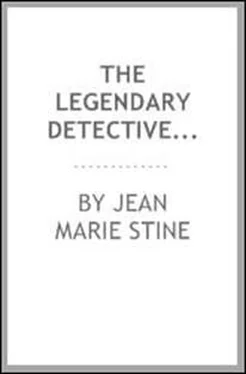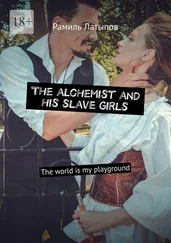"Lord, if the king knows I have been, he will kill me as he has slain my brother," said the man fearfully. "But I tell you this because I love Sandi, and because, when he comes to make a chief, he will not forget a son of the king who has helped him."
"Where did they take B'lala?" asked Bones, and the man told him.
"But, lord, if you go through the woods behind the city, they will kill you," urged the man, "for there are more warriors than trees, and each man is strong for my brother."
Bones did not hesitate. He had a short consultation with Murdock.
"You'll stay here, my dear old New Yorker," he said. "This naughty old feller won't do anything tonight-"
"I'm coming along with you," said Donald recklessly, and in the end his insistence prevailed.
They dropped into a small canoe, paddled softly down the river for a mile and, landing at a convenient place (here Donald nearly fell into the water) followed their guide for two hours through the dense woods which had hidden murders from time immemorial. Once green eyes glared at them ahead; once Donald heard the scream of a monkey in the grip of an invisible enemy.
It was midnight by the illuminated dial on Murdock's wrist when they came to a little clearing and saw a figure in the moonlight, reclining against a big, lightning-blasted tree.
"O B'lala," said Bones softly, "I am Tibbetti; the son of Sandi, and I have come to take you away to my fine ship."
He saw the thick lips of the child twist in a smile – guessed rather than saw the horror of his eyes.
"Lord, I go to a better place than your fine ship," he said faintly, "for this night I shall walk among the stars with my new ghost. Do I speak truth?"
At first Bones thought he was addressing him, but saw the head turn slightly to the left and heard the delighted chuckle of the dying boy.
"Lord," he said, "I speak truth. Now I tell you, Tibbetti, that there is death in this wood, for this my ghost has told me; also I saw you coming – I who have no eyes! You came in a little boat with my brother, and as you landed, the white man who is with you stumbled and fell."
Donald felt a cold shiver run down his spine.
"Who told you this?" he said in English, and, to Bones' amazement, this boy, who had never spoken any language but his own, answered:
"He who is by you!"
Again he turned his head.
"Lord Ghost, stay with Tibbetti and his friend, and be strong for them."
He waited, his head bent, as though he were listening. Bones saw him nod and again heard the delighted chuckle. Then he turned his head.
"Lord Tibbetti," he said, "my ghost has spoken, and he will be with you till you come to your journey's end, and he will be strong for you."
They waited for a long time, and when he did not speak Bones stooped and laid the figure gently on the ground.
"Humph!" he said, and got up, for he knew that B'lala, the friend of ghosts, was walking amongst the stars.
They buried him as best they could and trekked back to the river. Bones knew that there was only one hope, and that was to cast off the boat at once, risk shoals and sandbanks, and steam through the night to meet Sanders. A night in the native mind was an eternity. Perhaps N'kema would strike before dawn.
He struck earlier, as it proved. They were within half a mile of the village when a hoarse voice challenged them.
"Stand for the Little Leopard, white man!"
"Shoot!" snarled Bones, and whipped out his automatic.
The forest rang with the staccato crash of shots. Bones went down under three N'gombi warriors and waited expectantly for the end. Something struck him on the head…
It was the consciousness of pain which revived him. The sun was up, and he was sitting with his back to a slim tree, his arms most painfully drawn back, and knotted on the tree's other side; and within a few feet of him sat Mr. Donald Murdock, naked to the waist and bearing marks of battle.
"Hullo, you alive?… I thought they'd bumped you off," he said cheerfully. "What are they going to do?"
Bones turned his aching head left and right. They were entirely surrounded by spearmen; and sitting on his stool of chieftainship immediately before them, was N'kema the king.
"O Tibbetti, I see you!" he mocked. "Where is the great ghost of my little mad brother? Is he not by you and will not his strong arm be against me and my young men?"
Bones was puzzled: how did the king know of the meeting in the forest and all that the dying boy had said?
And then his eyes fell on something brown and still that lay in the long grass… a wisp of smoke curled up near by… the brother of the king, who had led him to B'lala, had told before he too found in death a pleasant relief.
"I see you, N'kema," he said hoarsely, for his throat was parched; "and as to madmen and ghosts, are you not mad to do this evil thing, and will not your ghost go weeping on the mountains when Sandi comes? Yet I will speak well for you and leave a book for Sandi, if you let this young man go." He nodded towards the uncomprehending Murdock, for Bones was speaking in the dialect of the N'gombi. "For he belongs to a strange people and has no part in this palaver."
N'kema grinned fearfully.
"O ko! That is the talk of a fool. Now let me see your ghost, Tibbetti. And if he is strong he shall hold the arm of my slayer."
He spat left and right and lifted his hand to his eyes. It was the signal to the lithe warrior who squatted at his feet, bending the supple execution knife in his hands. Up to his feet he rose and came swiftly before Bones.
"Speak well for me to all ghosts and devils," he muttered conventionally, and swung back his arm.
Bones glared up at him and did not flinch. The curved knife glittered in the sunlight, and then…
Bones heard a little thud, saw the knife drop from the man's hand, as he gripped a bloody elbow with a shriek of pain.
N'kema was on his feet, gray-brown.
"O ko!" he gasped. "This ghost…!"
And then he saw Sanders.
The Commissioner was standing on the edge of the clearing, and on each side of him knelt six tarboshed Houssas, their rifles leveled. Slowly Sanders walked across the open and the armed throng flowed back noiselessly, each man seeking the kindly obscurity of the forest.
"I see you, N'kema."
Sanders' voice was low, almost caressing. And then he pointed to a tree, and Sergeant Abiboo, who walked behind him, flung the rope he carried, so deftly that the noose slipped down over the smooth branch almost to the level of N'kema's neck.
* * *
"Ghosts – phew!" Donald wiped his brow. "Did you see… just as this bird was going to strike… something stopped him… that beats everything."
Bones coughed. He had seen the new silencers on the Houssas' rifles.
"We've got a pretty bright brand of bogies, dear old thing," he said.
Murdock shook his head.
"I've got a new slant on this spiritualistic business. There was something there – I'll swear it… Gosh! it was more awful than being carved up!"
"A common phenomenon, dear old Atlantist," murmured Bones.
"I'm going to cable Jane and say I'm strong for spiritualism if you get the right brand."
As it happened, it was unnecessary. The Eurasian operator handed him a cablegram as he arrived at headquarters:
"You are right. Spooks are bunk. Experts found professor's fingermarks on tin trumpet. Come home. JANE"
Donald shook his head.
"I've got to convince that girl," he said.
(Detective: Father Brown)
The fame of G. K. Chesterton’s (1874-1936) modest clerical detective, Father Brown, is second only to that of the wizard of Baker Street himself. Although he is unprepossessing, "as round and dull as a Norfolk dumpling… eyes as empty as the North Sea," this exterior hides one of the sharpest and most subtle brains in detectivedom. However, Father Brown’s aims are a bit different from those of most fictional detectives. Far from viewing culprits as wrongdoers in need of punishment, he sees them as misguided souls in need of salvation. In this respect, his greatest triumph comes when he meets the master-criminal, Flambeau, and reforms him. Thereafter the two work in harmony, with the brilliant, resourceful Flambeau still typically a step or two behind the good father. Father Brown’s original adventures spanned a twenty-four year period between The Innocence of Father Brown (1911) and The Scandal of Father Brown (1935). Chesterton’s priest-detective proved so popular that he was the basis of a television series staring BBC stalwart Kenneth Moore, as well as a half-dozen motion pictures in which he was portrayed, among others, by Alec Guinness.
Читать дальше












